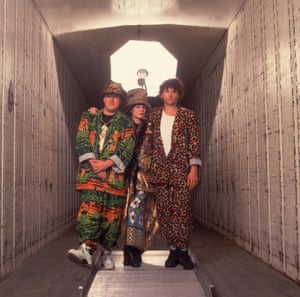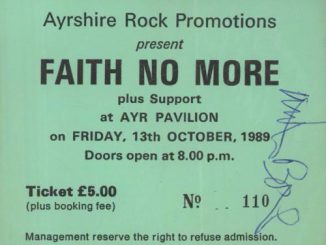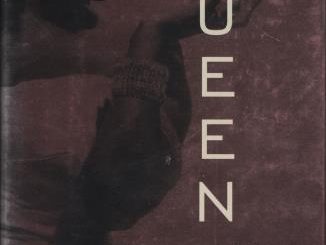From Andrew Martin at The Guardian
The band’s drummer describes his glory years with the post-punk art-rockers, his bass-playing wife, Tina, and the enigma that is David Byrne
Chris Frantz was the drummer, and the most normal-looking band member, being clean cut, bouffant-haired, with a liking for Brooks Brothers shirts. His wife, Tina Weymouth, was the bassist, and she rivalled the jittery Byrne for one’s attention. She was (and is) chic, elfin, the bass too big for her, but she swung it about like a dancing partner. Frantz’s memoir is the story of the band, of the Frantz-Weymouth marriage, which is apparently blissful (“How I adore her!”), and their relations with Byrne, which were less so.
Frantz was born in Kentucky, the son of an army lawyer who rose to be a general. In easy-going prose, he evokes a privileged Wasp childhood. When he told his mother he liked Elvis, she said: “Oh Chris! He’s so common!” After a false start with a trumpet, Frantz joined the drum section of the school band – “Boy, was I happy!” But it’s not all blitheness, and there are macabre, David Lynch-ian moments. “My mother enrolled me in the Peter Pan nursery school run by two very kind sisters who both answered to the name Miss Walters. They both had hunchbacks.”
Frantz met Weymouth on “a perfect New England day” at the Rhode Island School of Design. He saw her going past on an old yellow bike “as in a Truffaut movie”. He also met Byrne at RISD. He “had a full Rasputin beard, cut his hair very short by himself, wore secondhand clothes and rarely spoke to anyone”. Frantz, Weymouth and Byrne wrote a song, Psycho Killer, which, in 1977, would become the group’s first hit. Soon after, Frantz wrote the lyrics to the superbly ominous Warning Sign, which would appear on the group’s second album, initially credited to Byrne alone: “It appears that he had forgotten that I wrote those words…” On later pressings, Frantz was credited, but the gaunt, evasive Byrne seems to have cast a perpetual shadow on the otherwise sunny world of Frantz.

When Frantz first suggested they form a band, Byrne said “I guess so” without looking Frantz in the eye. Frantz took Byrne to dinner with his parents. “David was painfully gauche that night… At one point, he lined up a row of peas on his knife and let them roll into his mouth. Then he did it again.” But Frantz loved playing music with him. “He was a superb rhythm guitarist. He was also very willing to make an unexpected move, both musically and physically. He got into music to get out of himself.”
But apparently not too far out of himself. Frantz alleges that Byrne was generally slow to recognise the contributions of his bandmates (he “couldn’t acknowledge where he stopped and other people began”); and that “the more successful Talking Heads became, the more cold and dyspeptic David became”. Then again, he seemed to like it when things went wrong. Frantz thought him “strangely elated” after being arrested for jaywalking in Los Angeles. Byrne was silent about the worldwide success of Frantz and Weymouth’s very funky spin-off group, Tom Tom Club, except to ask, of one track that he happened to overhear: “How did you get that handclap sound?”
In 1991, Byrne “sneaked out of Talking Heads” and that was it, but what a ride Frantz enjoyed. He seems to record a “dream come true” about every 10th page, but I prefer his minor key. The mysterious Mr Byrne always brings this out, and it’s strongly present in Frantz’s account of the early days, when the Heads lived in the pre-gentrified Lower East Side of New York, an almost literal war zone. While searching for a loft to live in, they viewed one building that was on fire. One spring afternoon, Frantz walked over to the now-legendary club CBGB to ask for a gig. The place smelt of “beer, roach spray, dog doo [the owner, Hilly Kristal, had a free-roaming saluki] and Chanel No 5”.
There are many exquisite character portraits. A surprisingly solicitous Sid Vicious inspects Weymouth’s bleeding hands after a gig: “But Tina, have you ever tried using a plectrum?” Patti Smith “chewed gum a mile a minute, like a schoolyard speed freak”. There is Mick Jagger, alone and high in a New York jazz club, wearing “a huge, quilted pimp-style newsboy cap” and bawling along to Killing Me Softly by Roberta Flack (which was on the jukebox) but with his own lubricious adaptation of the lyrics.
That Frantz remained star-struck is one of his many winning qualities, and I commend Remain in Love to discerning rock fans everywhere.
Remain in Love: Talking Heads, Tom Tom Club, Tina by Chris Frantz is published by White Rabbit (£20). To order a copy go to guardianbookshop.com. Free UK p&p over £15 or order it here
*****
Collecting Vinyl, CDs or Memorabilia by Talking Heads, David Byrne, Tom Tom Club & More? Explore what’s in at eil.com today here
eil.com – the world’s best online store for rare, collectable & out of print Vinyl Records, CDs & Music memorabilia since 1987




Be the first to comment